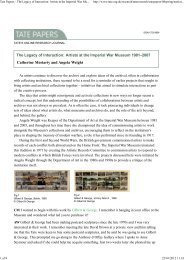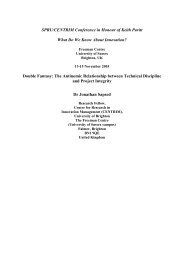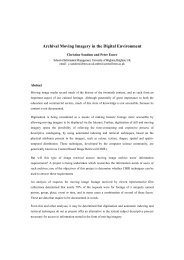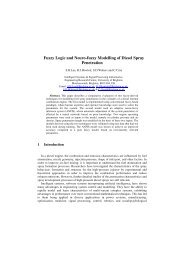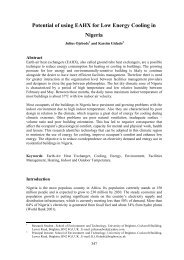NESTA Crime Online - University of Brighton Repository
NESTA Crime Online - University of Brighton Repository
NESTA Crime Online - University of Brighton Repository
Create successful ePaper yourself
Turn your PDF publications into a flip-book with our unique Google optimized e-Paper software.
assumptions about the various types <strong>of</strong> business model and their features but have<br />
failed to demonstrate how much cybercrime falls into each category. However, with the<br />
fast adoption <strong>of</strong> the Internet, online business models have proliferated in recent years.<br />
Our interviews have largely supported this view, and made an important call to improve<br />
both the general understanding and the necessary technical knowledge to prosecute<br />
Internet-based business models – since current efforts seem to be placed in traditional<br />
<strong>of</strong>fline and hybrid methods.<br />
3 Conclusions and recommendations<br />
3.1 The future trends for cybercrime<br />
Involvement in cybercrime is likely to continue on the path <strong>of</strong> low risk and high<br />
gain. New business models and new entrants encouraged by low barriers to<br />
entry are already emerging.<br />
The organisational and technological capabilities <strong>of</strong> cybercriminals, particularly with no<br />
global counter-strategy, will likely go deeper and wider into the foreseeable future. As<br />
cyberspace develops further, new opportunities will open up.<br />
It remains to be seen how the current global financial crisis will affect this situation. If it<br />
is deep and prolonged, this may hit the emerging and educated middle classes in<br />
developing countries harder than most and encourage a new generation <strong>of</strong> under- or<br />
unemployed youth with IT skills to seek entry into the pr<strong>of</strong>itable and comparatively low<br />
risk world <strong>of</strong> cybercrime. The BRIC countries have already seen the start <strong>of</strong> such a<br />
growth. Countries in South East Asia, the Middle East and Central and Southern Europe<br />
cannot be too far behind the further extensive diffusion <strong>of</strong> IT capabilities into Africa,<br />
Asia, Latin America and parts <strong>of</strong> Europe.<br />
As more countries gain substantial economic power, global solutions to global problems<br />
will become more difficult to attain – genuine, broad based consensus will replace the<br />
viewpoint <strong>of</strong> a single superpower. In the absence <strong>of</strong> effective global governance and<br />
leadership, loose networks will proliferate to pursue convergent goals and interests.<br />
This can also be seen within the cybercrime ecosystem and, moreover, the ecosystem<br />
perspective permits a clearer view <strong>of</strong> multipolarity within the cybercrime universe, with<br />
Page 80





